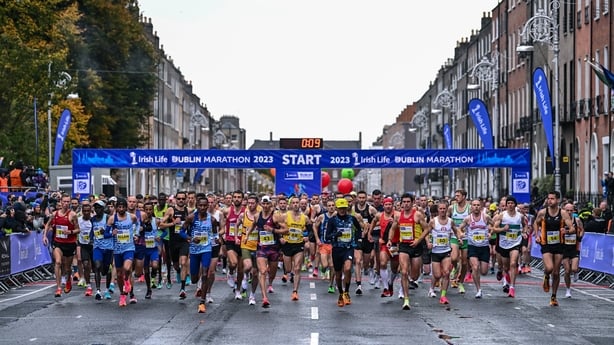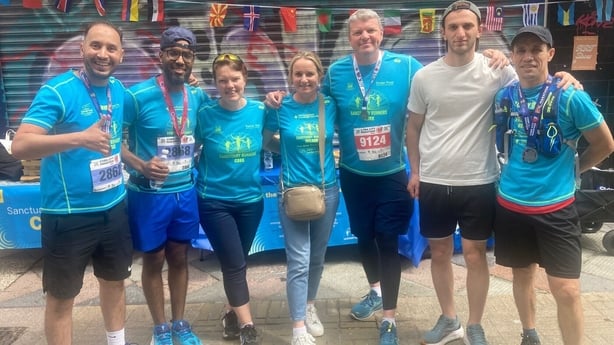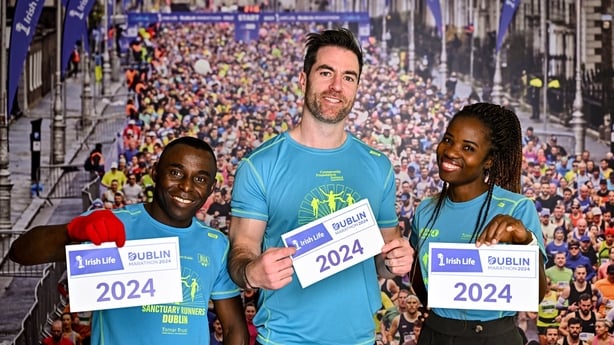Anwar Ali is stepping into the unknown when he tackles his first marathon around the streets of Dublin next Sunday.
Born in Aden, a city in the south of Yemen, he left home in 2011 and has never returned to his homeland.
Ali is one of the 22,500 who have signed up to the fourth-largest European marathon, but plotting his way around the 26.2 mile course pales into insignificance when you consider the challenges he has faced since leaving war-torn Yemen.
The 31-year-old, who only completed his first 5km in February of last year just three months after arriving to Ireland, is among a group of 25 Sanctuary Runners seeking international protection or refugee status taking part in this year's Irish Life Dublin Mararhon - a record number.
The growth of the Sanctuary Runners movement – established in Cork six years ago to promote solidarity-through-sport, the movement now boasts 40 groups across the country – has come at a time where the anti-immigration movement has never been more vocal.
The group's distinctive light blue t-shirts will be dotted around the city with 100 runners from 18 countries represented on their team this year.
In total the group will have 100 runners from 18 countries pounding the capital’s roads. With community inclusion at the heart of their ethos, the event known as one of the friendliest city marathons can be expected to row in behind a unique group of runners.
The 25 international protection applicants – believed to be the highest number of people with that legal status to have ever ever taken part in a marathon – represent 13 different countries and live in direct provision centres and emergency accommodation in Dublin, Louth, Monaghan and Cork.
Sanctuary Runners founder Graham Clifford will be running his sixth marathon. While he has the availability to things so many of us take for granted – access to appropriate clothing and footwear, shelter, nutritious food and technology such as a running watch – he highlights this is a world removed for some of his running team-mates.
"Many of those running with us on Sunday will have been moved to new accommodation once or twice in the last 12 months," he says.
"Some spent times living in tents. Those who haven't will be living in accommodation centres full of people, sharing rooms, washing facilities and often waiting for months to get work permits and when they do, working unsociable hours in tough conditions.

"Training for a marathon takes lots of time and energy and often people living in direct provision are running on empty.
"Thats why it’s just so incredible to see the dedication of our marathon runners. Despite all the challenges they face, often in a hostile environment, they display class, grace and determination which will bring them to the start line.
"They are incredible people, each and every one of them and it’s an absolute honour to run alongside every member of our team."
Ali’s journey has enough chapters to fill a few books. He arrived in Ireland in late 2022 and is grateful to have the opportunity for a new beginning.
Born in Aden, south Yemen, he left home after completing secondary school in 2011. While they were spared some of the more extreme hardships in the north at the time, it was clear to him that economic decline and institutional collapse was only going to worsen.
Since violence broke out in late March 2015, Yemen - already one of the poorest countries in the Middle East – has seen its economy shrink by half and more than 80% of the population now live below the poverty line. Only 10% of the population has access to publicly supplied electricity.
He left behind his mother and two sisters, who have since relocated within the country. In the last decade, close to five million Yemenis have been internally displaced, with the country among the top six largest internal displacements in the world.
Turkey was his base for the next four years. The language barrier meant plans to further his education had to be put on hold. He saved up what he could and decided to take his chances on getting a boat to Greece. The journey took less than an hour, yet was still fraught with danger for him and his 10 travelling companions.
"I don’t even know how to swim," he says. "It was a scary experience. When I look back now, you realise it was crazy what you were doing, but not at the time. You just feel like you have to do it."
What he remembers just as clearly was the local hospitality. They offered food, but more importantly than that, compassion.
From there Ali moved north with a small group, moving through North Macedonia, Serbia and Hungary. He knew of people that had setup home in Finland and on little more than a wing and a prayer, landed in Helsinki.
For seven years he grafted. Finnish courses were undertaken so he could give himself the best employment opportunities. Decent accommodation was a nod to his progress, yet the nagging sense that social inclusion would never materialise kept nagging at him.
"As someone who came from the Middle East, a very sociable culture, it was a big change. Scandinavian culture I found to be not quite as sociable as Yemen, or even Turkey. The people can be a little more private."
He’d heard reports about Ireland, the culture and the people, and reports had come back to him from others in a similar position to his own.
I find it easy to be around Irish people, culturally it's not that different to what I was used to in Yemen
Late in 2022 he arrived on our shores, initially in Maynooth for a short period before he was placed in Termonfeckin, 8km north-east of Drogheda.
Life he says has been good to him in Louth. A labour market access permit has allowed him to work, and progress, at the local bakery. The accommodation isn’t ideal – he shares a room with seven others – but remains philosophical about his situation.
"No-one likes to be in a room with so many people, but at the same time, I can see the capacity issues," he says. "The Irish government seem to be doing their best. I treat it as a temporary measure. I don’t plan on staying there forever. It’s part of the journey for me."
The pride in his work, the beauty of the area and the acceptance of the locals more than compensates. He’s aware of the anti-immigration noises but it’s not his lived experience.
"I really enjoy the Irish culture. People are friendly, happy to talk to you. I find it easy to be around Irish people, culturally it’s not that different to what I was used to in Yemen.
"I’m here two years now and I know so many Irish people. Compared to my time in Finland, I have much deeper relationships."
Running has also been a hugely positive aspect of his time in Ireland.
In February 2023, local Sanctuary Runner volunteer Maureen Harbison dropped into the accommodation. She wanted to let them know about an upcoming 5km run and that if there was any interest, they would look after the logistics, from collecting and picking up to clothes and runners.
With no training and no expectations, Ali decided to give it a go, his first ever race.
"It was such a great, amazing feeling."

From there he hasn’t looked back. Drogheda District Athletic Club offered free membership, and with the support of the club and Sanctuary Runners, he joined Tuesday and Thursday sessions with the club, linking in with the Sanctuary Runners at the weekend.
"I got to meet new people. I never thought I would be a runner, but for me it’s a joyous side of life. It’s beautiful".
A 10km was soon conquered despite reservations. Last year he joined a supporters bus from Drogheda to witness the Dublin Marathon first hand.
"I had the time of my life. It was amazing to see the waves and waves of runners."
During the day, some of his fellow supporters kicked around the idea of taking part in 2024. Swept away by the emotion of the day, Ali declared he would commit. He wanted to be inside the ring.
Sanctuary Runners reached out to the Irish Life Dublin Marathon organisers who once again provided entries for Sanctuary Runners living in direct provision.
"The inclusion programme acknowledges and supports those who may otherwise not have the opportunity to participate in the marathon. For the third year in a row, Sanctuary Runners has been one of the recipients of this initiative, a reflection of the positive collaboration."

Like any runner, training hasn’t been 100%, yet Ali's obstacles are unlike the vast majority of those set to tackle the course.
The long Sunday runs have been banked and he doesn’t feel any time pressure; there’s no specific clock target dominating his thought process.
"I just want to enjoy the new experience and get to the finish line."
On one of the most uplifting days in the Irish capital, Clifford feels the 43rd staging of the Irish Life Dublin marathon has even greater significance.
"To the best of our knowledge, there has never been such a sizeable group of refugees or international protection applicants (25) to partake in an established marathon event anywhere in the world before," he says.
"We're so proud of each and every one of our team, especially those in direct provision. The Sanctuary Runners focus on solidarity, friendship and respect and so over those 42.2 kilometres you can be sure we will all be helping each other get over that finish line.
"Now, more than ever, it’s so important we show compassion with and for all, to be decent, to be sound. And we know the crowd along the way will give our team an extra little roar of support as we pass by."
The Irish Life Dublin Marathon will take place on Sunday, 27 October, with up to 22,500 entrants expected to take part on a course featuring a new start and finish.
Disclaimer: The copyright of this article belongs to the original author. Reposting this article is solely for the purpose of information dissemination and does not constitute any investment advice. If there is any infringement, please contact us immediately. We will make corrections or deletions as necessary. Thank you.






